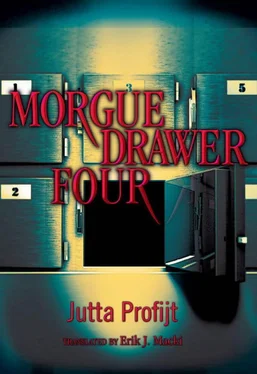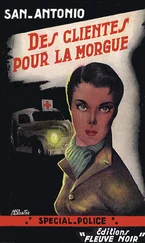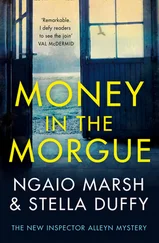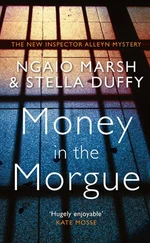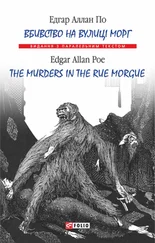“Pascha.”
Longer pause.
Gregor: “Who is Pascha?”
Martin: “That’s the name Sascha went by.”
Gregor: “And he told you this?”
Martin: “Exactly.”
Gregor: “When?”
Martin: “Shortly after the postmortem.”
Unpleasantly long pause.
Gregor: “You mean, after you cut up his body, removed all the organs and preserved a small piece of each, stuffed everything back into the abdominal cavity, and then sutured him back up again?”
Martin: “Exactly. His spirit isn’t dead. He can’t find peace. He’s been buzzing around us down in the morgue.” Rather long pause.
Gregor: “And he talks to you?”
Martin: “Exactly.”
Very long pause. Martin took a microsip of his coffee again, presumably so he could nurse the one mugful through the whole morning, or at least as long as this interrogation lasted. I waited with quasi-bated breath for Gregor’s reaction. We could only assume the worst based on his expression; to my boundless regret I couldn’t find any way into the convolutions of his brain.
“Do other dead people talk to you?” Gregor asked.
Martin shook his head.
“Can your colleagues hear this Pascha, too?”
“No, I’m the only one he can contact.”
“And he told you that you’re supposed to find out the identity of this woman?”
Martin nodded.
“Why?”
Martin sighed. “He wants me to find out who pushed him. I couldn’t exactly include in my report that he told me he was pushed. And the connection to that woman’s body in the trunk and all of that—there was no way for me to have known that, and so I didn’t tell you anything about it either, because then I’d have to tell you about him—and there’s absolutely no one who would believe me. Right?”
Martin looked into Gregor’s eyes for the first time. Now Gregor was the one who looked away.
“That’s what I thought,” Martin said. “Two weeks ago I wouldn’t have believed it myself.”
Neither of them said anything again for a while, and then Gregor went back into the bathroom, got dressed, came back out, and sat next to Martin at the table.
“You should take some time off,” he told Martin. Martin shook his head.
“Then at least take today off.”
“I’m off this morning,” Martin said. “But this afternoon I’m on duty.”
Gregor stood up and explained to Martin in a rather official voice that he should please refrain from investigating dead Jane Does since he was interfering with the detectives’ investigation, and then Gregor said goodbye in his friendly voice again, and left. Martin looked at the clock, ran his fingers through his still-damp hair, and stood up.
“We’ve got to get going,” he said.
“Where to?” I asked Martin.
“To your funeral.”
The moment I had secretly been scared stiff of the whole time had finally arrived: my funeral. Naturally, I hadn’t anticipated attending it. Well, that is, I hadn’t anticipated naturally attending it. My body was the main attraction, you know. I had successfully suppressed any thought that I, that is, my own consciousness, would watch myself be buried. Suppression was now a thing of the past.
“Do we have to?” I asked Martin.
“Yes,” he replied.
Why was he being so curt now? Today, at the most difficult hour of my life when we were about to watch me being lowered into the ground? I needed emotional support, and Martin was being kind of an asshole.
“But I don’t want to,” I said.
“Then I’ll drop you off at the Institute,” he said.
Heh, that’s what he was planning the whole time! My body is being taken away, my morgue drawer reassigned, and he thinks in all seriousness he can just ditch me in that hideous high-rise?
“What am I supposed to do there?” I asked.
Now I had him. Martin froze in mid-motion. His fingers, which wanted to tie his shoelaces, started to tremble. Well, my dear Martin, you apparently didn’t think that far in advance. My only Attachment Figure in the whole, entire world is YOU! I didn’t think I’d ever be able to shake the panic I saw shooting through his brain. His best friend now thought he was overworked—at the very least. But in any case Gregor hadn’t believed a single word, that was quite clear. Other people such as his colleagues and managers would certainly not be as ginger in their assessment of his mental health. Crazy, they’d say, and Martin—I could sense it at this moment with full-on clarity—was starting to firmly embrace the notion that he would in fact go crazy if I kept haunting around in his head.
“I think you should come,” he said in a less-than-firm voice. “Maybe it’ll be good for you to see your parents one more time.”
Now I was the one who was shocked. My parents. Oh, God.
No one said anything.
Maybe that was his idea. For me to cleave back to my parents, leave him in peace, and move back home. Back into my old room with posters of Ferraris and Pamela Anderson on the wall. But my room probably didn’t exist anymore; my father had presumably converted it into a study, or my mother into a dressing room. Whatever it was, I would go along to my funeral because I knew very well that otherwise I would obsess night after night about what it had been like. How my parents had looked. What my coffin looked like, and whether I would have liked the grave site. I slipped behind Martin through the living room door, climbed into the trash can with him, and was silent, just like him. You might have taken us for an old married couple the way we were driving to my funeral, each lost in our own thoughts.
The cemetery looked the way cemeteries do in winter. The tall trees, which surely cast a friendly, calming green shimmer over the graves in springtime, were now bare and thus looked like shit. I’ve never been one for bare trees. Whether capped with snow or not, in sun or fog: I think they just look dead.
The wide pathways through the cemetery were muddy, and there were lanterns on many of the graves with those awful candles in their little plastic cups burning inside. In the dark they always make the cemetery look haunted with all those little lights flickering everywhere.
I was familiar with this cemetery because my grandmother was buried here, and my parents used to come visit at least twice a year, on Gran’s birthday and on some other sad day in November. They would light one of those little flickering lights and pretend to pray for a while before going back home and shoveling cake into their mouths. I had to go along until I was twelve, and then my father stopped going, too. I have no idea how long my mother kept up the tradition. Starting tomorrow, though, she could visit two graves at once. My birthday happens to be in November, so maybe she can cover the November visits at the same time, too. More practical.
Martin found his way to the cemetery chapel without getting lost, although as far as I was concerned the paths all looked the same. I never knew if I should take the third or fourth crosscut, but Martin knew. He was just being precise—as always.
There was a sign in front of the chapel with my name and the time of the burial on it. My name. That queasy feeling started getting stronger. Pretty soon it would be serious.
Martin swallowed, too, even though he hadn’t known me at all when I was alive. And he knew that I wasn’t dead now, too. Funny thing. Should you be sadder that the body is dead, or happier that the spirit is alive? But is a life like mine, where I’ve got only a very restricted radius of action, really any comfort? I could feel Martin struggling with these thoughts, and I couldn’t help him answer his questions. Plus, I myself didn’t know what the alternative was. Would “dead” mean that my spirit just ceased to exist, as well? Or would it exist somewhere else, where other spirits were flitting around? Would we be able to talk to each other, make fun of each other, tell jokes? Keep following events on earth? Make bets? With what kind of money? I’d never given any thought to things like this when I was alive, but now, in view of my special situation, they were cropping up naturally, like a cold sore after a wet kiss.
Читать дальше
